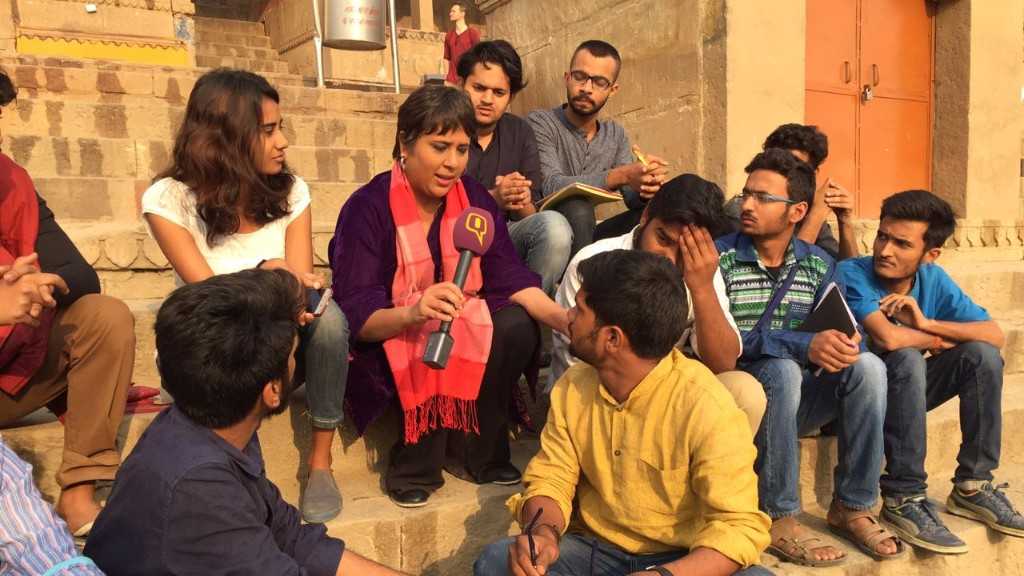In the last year and a half, many college students were at the center stage of mainstream discussions in India: Rohith Vemula from the University of Hyderabad, Kanhaiya Kumar, Umar Khalid and Shehla Rashid from JNU, Debjyoti Das from Jadavpur university, and Gurmehar Kaur from Delhi University to name a few. Never in India’s history have more cameras zoomed inside the university campuses.
Is there an undercurrent of political upheaval in India? Are students of these universities driving the change? Is the mainstream media serving as a vehicle for this change?
No, there is nothing of this sort happening in India. Things are more than normal both inside the universities and outside of it. As Morpheus puts it in the movie Matrix, “It is the world that has been pulled over your eyes to blind you from truth.”
With the help of a single example, I will demonstrate how an issue is peddled in the minds of vulnerable and immature college students, and how is it made global.
This morning, when I was browsing through my Facebook feed, I saw Barkha Dutt streaming live on Facebook with a handful of students at Reewa Ghat in Banaras.
The 52-minute long discussion was primarily based on the observations of a couple female students from one of the many colleges of BHU, who had perceived the general rules of their hostel to be biased towards male students.
The issues, specific to one of the college hostels of BHU were as stated below:
1. At Rs 80, boys get a proper nonvegetarian meal while girls get only egg in non-veg.
Remarks: Clarified by one of the girls – Girls get 4 meals while boys get only 2 meals a day.
2. LAN is laid out in boys’ hostel but not in girls’ hostel.
Remark: Only LAN ports are available but no connection. The college campus is going to get wi-fi.
3. No curfew in boys’ hostel while girls can’t go out after 8 pm.
Remarks: The restrictions are for boys’ hostel too, but no one follows it.
I, an ordinary columnist of an online platform with a huge reach feel ashamed of wasting the reader’s time in discussing these petty issues. But a journalist like Barkha Dutt responded very proudly, “I am a feminist and I can’t accept any discrimination between male and female,” to a similar FB question.
Fifteen minutes into the discussion, Barkha had twisted the topic to relate it to Azadi. While setting the premise with her monolog, she started with the definition of Azadi, why the word should not be politicized and why Azadi shouts should not be restricted to JNUs and DUs. She very sophisticatedly coated the aforementioned petty issues into the Azadi cocoon. (In the meantime, she called a guy who was very vocal of Azadi to come in the front row).
By this time, students had started feeling the sense of ownership and responsibility towards getting Azadi. As the discussion progressed, everyone was turning out to be warriors and patrons of Azadi.
All that was required now was to draw the battle lines. Within minutes, Students were telling Barkha stories that how their voices are being curbed by the administration. (In the meantime, Barkha had inserted the keywords ‘shame BHU’, to make them trend on Twitter.)
Throughout the discussion, Barkha was in total control. Whenever she felt the momentum dipping, she used to go back to the Azadi guy (whom she had brought forward) and he started talking about intolerance, anti-nationalism and all sort of nonsense.
Soon Barkha started going into the internal politics of the college. She mentioned the ‘tiranga yatra’ to trap a couple of ABVP students to turn it on.
Before they could realize, the discussion had shifted to the freedom of expression and constitutional right debate.
Finally, Barkha toed the dangerous lines of student elections. She asked individually who wanted student elections in BHU in the similar lines of DU and JNU. By now, as everyone was a party to her, all started demanding student elections. She smiled triumphantly and narrated her story to her soldiers about her days of activism in St. Stephens College where she fought to end gender discrimination.
In less than an hour, Barkha had turned innocent but gullible students of BHU into pseudo-liberal activists, who should have a problem with everything.
The second and equally important part was to sell this story and spread the words to the maximum number of students outside. The Quint did the job for her.
This Facebook live stream was titled as “Shocking gender divide: BHU battle lines”. Frankly, if these are shocking examples of gender discrimination, then India is the best place to live on earth. The Quint understands that too. However, a title like this is capable of influencing two types of audiences: One that prefers to offer their opinions based on the perceived notions, will start assuming BHU as a highly gender biased university. Other, socially inclined that tries to understand the discussion of gender bias, and will ultimately come out as the sympathizers of the Azadi brigade.
Kiren Rijiju was not far from the truth when in reference to Gurmehar Kaur, he asked, “Who is polluting the young girl’s mind?” However, the govt’s duty is not to ask questions but to give solutions.
https://www.facebook.com/quintillion/videos/774014826099041/?hc_ref=PAGES_TIMELINE
